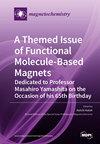Interplay of Magnetic Interaction and Electronic Structure in New Structure RE-12442 Type Hybrid Fe-Based Superconductors
IF 2.6
4区 化学
Q2 CHEMISTRY, INORGANIC & NUCLEAR
引用次数: 0
Abstract
We present detailed first-principles density functional theory-based studies on RbRE2Fe4As4O2 (RE = Sm, Tb, Dy, Ho) hybrid 12442-type iron-based superconducting compounds with particular emphasis on competing magnetic interactions and their effect on possible magneto-structural coupling and electronic structure. The stripe antiferromagnetic (sAFM) pattern across the xy plane emerges as the most favorable spin configuration for all the four compounds, with close competition among the different magnetic orders along the z-axis. The structural parameters, including arsenic heights, Fe-As-Fe angle, and other relevant factors that influence superconducting Tc and properties, closely match the experimental values in stripe antiferromagnetic arrangement of Fe spins. Geometry optimization with inclusion of explicit magnetic ordering predicts a spin–lattice coupling for all the four compounds, where a weak magneto–structural transition, a tetragonal-to-orthorhombic structural transition, takes place in the relaxed stripe antiferromagnetic spin configuration. Absence of any experimental evidence of such structural transition is possibly an indication of nematic transition in RE-12442 compounds. As a result of structural distortion, the lattice contracts (expands) along the direction with parallel (anti-parallel) alignment of Fe spins. Introduction of stripe antiferromagnetic order in Fe sub-lattice reconstructs the low-energy band structure, which results in significantly reduced number of bands crossing the Fermi level. Moreover, the dispersion of bands and their orbital characteristics also are severely modified in the stripe antiferromagnetic phase similar to BaFe2As2. Calculations of exchange parameters were performed for all the four compounds. Exchange coupling along the anti-parallel alignment of Fe spins J1a is larger than that for the parallel aligned spins J1b. A crossover between the super-exchange-driven in-plane next-nearest-neighbor exchange coupling J2 and in-plane exchange coupling J1a due to lanthanide substitution was found. A large super-exchange-driven next-nearest-neighbor exchange interaction is justified using the construction of 32 maximally localized Wannier functions, where the nearest-neighbor Fe-As hopping amplitudes were found to be larger than the nearest- and the next-nearest-neighbor Fe-Fe hopping amplitudes. We compare the hopping parameters in the stripe antiferromagnetic pattern with non-magnetic configuration, and increased hopping amplitude was found along the anti-parallel spin alignment with more majority-spin electrons in Fe dxz and dxy but not in Fe dyz. On the other hand, the hopping amplitudes are increased in stripe antiferromagnetic phase along the parallel spin alignment with more majority-spin electrons in only Fe dyz. This difference in hopping amplitudes in the stripe antiferromagnetic order enables more isotropic hopping.新结构RE-12442型混合铁基超导体中磁相互作用与电子结构的相互作用
我们对RbRE2Fe4As4O2(RE=Sm,Tb,Dy,Ho)杂化12442型铁基超导化合物进行了详细的第一性原理密度泛函理论研究,特别强调了竞争磁相互作用及其对可能的磁结构耦合和电子结构的影响。xy平面上的条纹反铁磁(sAFM)图案是所有四种化合物最有利的自旋构型,沿z轴的不同磁阶之间存在密切竞争。结构参数,包括砷高度、Fe-As-Fe角以及其他影响超导Tc和性能的相关因素,与Fe自旋条纹反铁磁排列的实验值非常吻合。包含显式磁有序的几何优化预测了所有四种化合物的自旋-晶格耦合,其中在弛豫条纹反铁磁自旋构型中发生弱磁结构转变,即四方到正交结构转变。缺乏这种结构转变的任何实验证据可能表明RE-12442化合物中存在向列相转变。由于结构畸变,晶格沿着Fe自旋平行(反平行)排列的方向收缩(膨胀)。在Fe子晶格中引入条纹反铁磁有序重建了低能带结构,这导致穿过费米能级的能带数量显著减少。此外,在类似于BaFe2As2的条纹反铁磁相中,能带的色散及其轨道特性也发生了严重的改变。对所有四种化合物进行了交换参数的计算。沿着Fe自旋J1a的反平行排列的交换耦合大于平行排列的自旋J1b的交换耦合。由于镧系元素的取代,发现了超交换驱动的平面内次近邻交换耦合J2和平面内交换耦合J1a之间的交叉。使用32个最大局部化Wannier函数的构造,证明了大型超交换驱动的次近邻交换相互作用是合理的,其中发现最近近邻Fe-As跳跃幅度大于最近近邻和次近邻Fe-Fe跳跃幅度。我们比较了条纹反铁磁图案和非磁性构型中的跳跃参数,发现在Fe-dxz和dxy中,随着更多的多数自旋电子的反平行自旋排列,跳跃幅度增加,但在Fe-dyz中没有。另一方面,条纹反铁磁相中的跳跃幅度沿着平行自旋排列增加,只有Fe-dyz中有更多的多数自旋电子。条纹反铁磁阶跃振幅的这种差异使得能够实现更各向同性的跳跃。
本文章由计算机程序翻译,如有差异,请以英文原文为准。
求助全文
约1分钟内获得全文
求助全文
来源期刊

Magnetochemistry
Chemistry-Chemistry (miscellaneous)
CiteScore
3.90
自引率
11.10%
发文量
145
审稿时长
11 weeks
期刊介绍:
Magnetochemistry (ISSN 2312-7481) is a unique international, scientific open access journal on molecular magnetism, the relationship between chemical structure and magnetism and magnetic materials. Magnetochemistry publishes research articles, short communications and reviews. Our aim is to encourage scientists to publish their experimental and theoretical results in as much detail as possible. Therefore, there is no restriction on the length of the papers. The full experimental details must be provided so that the results can be reproduced.
 求助内容:
求助内容: 应助结果提醒方式:
应助结果提醒方式:


